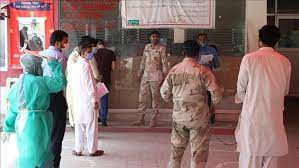On Wednesday, Sindh Health Minister Dr. Azra Fazal Pechuho said Pakistan has reported its first “suspected” case of the novel coronavirus variation Omicron in a woman in Karachi, adding that a genomic analysis was being conducted for confirmation.
She noted in a video message that while the coronavirus patient’s sample had not been subjected to genome analysis, but “the way the virus is behaving, it seems like it is Omicron.”
Furthermore, she added, “Omicron is very transmissible but deaths or serious [conditions] have not been seen in recent reports coming from South Africa (where the variant was first detected). There is no cause for concern. We are conducting a genomic study which will take one or two weeks.”
She noted that once the testing was completed, it will be determined whether the woman was infected with the Omicron variant.
The minister’s remark came just hours after Mehar Khursheed, the media coordinator for the provincial health department, verified the discovery of the first Omicron case in a woman from Karachi. She added the diseased woman had been brought to Aga Khan University Hospital for treatment since she had not been vaccinated.
The Regional Disease Surveillance and Response Unit in Karachi “reported the first case of novel Covid-19 ‘Omicron’ variant on December 8, 2021, at 7 pm,” according to a letter issued by the district health officer of Karachi’s East district to the provincial director-general of health.
The woman, who was 65 years old at the time, was unvaccinated and had no travel history. On Wednesday, she was released from the hospital and began isolating herself at home.
The quick reaction team was “brought on board immediately” for tracing, testing, quarantining, vaccination, and other preventive steps to stop the spread of the infection in accordance with the National Command and Operation Centre’s instructions.
The woman’s family was also contacted quickly by the district’s health team in order to obtain a full history and track down her contacts.
Arrival of Omicron
Last month, Asad Umar, the Federal Planning Minister, and Dr. Faisal Sultan, the Special Assistant to the Prime Minister on Health, warned that the Omicron variant’s arrival was inevitable and only a matter of time.
“This [strain] has to spread over the entire world because, as we’ve seen before when a variety emerges, the world is so interconnected that it’s hard to stop it,” Umar said, adding that vaccination was the most reasonable way to combat the threat.
In response to the threat posed by the new variation, the Sindh government published new guidelines on November 30 that will be in effect from December 1 to 15.
Covid-19 curbs in Sindh:
- Indoor, outdoor gatherings allowed for vaccinated individuals. For Karachi, Sukkur, and Sanghar the limit is 500 people for indoor events and 1,000 for outdoor. For the rest of the province, it is 300 people for indoor and 1,000 for outdoor.
- Indoor dining allowed for vaccinated people till 11:59 pm. 70pc occupancy for Karachi, Sukkur, and Sanghar and 50pc for the rest of the province.
- Outdoor dining is allowed for fully vaccinated citizens till 11:59 pm.
- Markets and businesses can function till 10 pm while essential services can operate 24/7.
- Shrines, indoor gyms, and cinemas are open for fully vaccinated individuals.
- 100pc attendance at offices with routine timings.
- Amusement parks and swimming pools will operate at 70pc occupancy in Karachi, Sukkur, and Sanghar and 50pc for the rest of the province.
The district administration was also asked by the Sindh chief secretary to demonstrate its entire commitment to enforcing non-pharmaceutical interventions and to take harsh action against offenders.
Due to the higher danger of transmission and re-infection posed by the Omicron form, the Sindh health authority had already chosen to inoculate all inhabitants with a Pfizer booster dose.
Travel ban
Pakistan had placed a complete ban on Nov 27 on travel from six southern African countries:
- South Africa.
- Lesotho.
- Eswatini.
- Mozambique.
- Botswana.
- Namibia.
- Hong Kong.
This travel ban was later extended to nine more countries:
- Croatia.
- Hungary.
- The Netherlands.
- Ukraine.
- Ireland.
- Slovenia.
- Vietnam.
- Poland.
- Zimbabwe.
Additionally, the NCOC placed 13 countries in Category B:
- The United States.
- The United Kingdom.
- Germany.
- Trinidad.
- Tobago.
- Azerbaijan.
- Mexico.
- Sri Lanka.
- Russia.
- Thailand.
- France.
- Austria.
- Afghanistan.
- Turkey.
Passengers from these countries must be fully vaccinated, and anyone over the age of six must have a negative PCR test report produced within 48 hours of boarding.
The World Health Organization has classed Omicron as a “very transmissible” variant, the same category as the dominant Delta variant.



